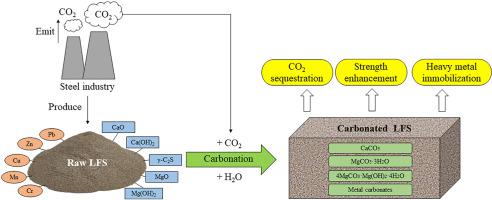Chemosphere ( IF 8.8 ) Pub Date : 2021-09-20 , DOI: 10.1016/j.chemosphere.2021.132274 Bo Xu 1 , Yaolin Yi 1

|
Ladle furnace slag (LFS) is a by-product of the steel industry and is difficult to be reused due to its weak cementitious property, low strength, and potential leaching of heavy metals. The emission of carbon dioxide (CO2) is also a concern for the steel industry. Therefore, the aim of this study was to use CO2 to immobilize heavy metals in LFS and enhance its strength. The LFS specimens were carbonated with different initial water contents, CO2 pressures, and carbonation periods. The carbonated LFS were then studied by leaching test, unconfined compressive strength (UCS), X-ray diffraction (XRD), thermogravimetric analysis (TGA), fourier transform infrared spectroscopy (FTIR), and field emission scanning electron microscopy (FESEM) with energy dispersive X-ray spectroscopy (EDX). The results showed that LFS had carbonation reactivity and could sequester CO2 up to 9.6% of its own mass. The carbonation also effectively reduced the leaching of heavy metals from LFS, especially Pb and Zn. The concentrations of leached Pb and Zn of carbonated LFS were significantly reduced from 2760 and 1460 μg/L to 0.11 and 0.56 μg/L, respectively, being one order of magnitude (Pb) or three orders of magnitude (Zn) lower than limits of inert waste and three drinking water regulations. The strength of the carbonated LFS also remarkably increased and was two orders of magnitude higher than that of the uncarbonated LFS. Following the carbonation, calcium carbonate, nesquehonite, and hydromagnesite were produced; these carbonates filled pores and bound LFS particles, which enhanced the strength of LFS.
中文翻译:

碳化处理钢包炉渣:二氧化碳封存、重金属固定、强度增强
钢包炉渣(LFS)是钢铁工业的副产品,由于其胶凝性弱、强度低、易浸出重金属,难以再利用。二氧化碳 (CO 2 )的排放也是钢铁行业关注的问题。因此,本研究的目的是利用CO 2来固定LFS中的重金属并增强其强度。LFS 样品用不同的初始水含量、CO 2进行碳酸化压力和碳化期。然后通过浸出试验、无侧限抗压强度 (UCS)、X 射线衍射 (XRD)、热重分析 (TGA)、傅里叶变换红外光谱 (FTIR) 和场发射扫描电子显微镜 (FESEM) 与能量色散 X 射线光谱 (EDX)。结果表明,LFS 具有碳化反应性,可以封存 CO 2高达自身质量的 9.6%。碳酸化还有效地减少了 LFS 中重金属的浸出,尤其是 Pb 和 Zn。碳酸化 LFS 的浸出 Pb 和 Zn 浓度分别从 2760 和 1460 μg/L 显着降低至 0.11 和 0.56 μg/L,比限值低一个数量级(Pb)或三个数量级(Zn)惰性废物和三项饮用水法规。碳酸化 LFS 的强度也显着增加,比未碳酸化 LFS 的强度高两个数量级。碳酸化之后,产生了碳酸钙、三水菱镁矿和水菱镁矿;这些碳酸盐填充了孔隙并结合了 LFS 颗粒,从而增强了 LFS 的强度。



























 京公网安备 11010802027423号
京公网安备 11010802027423号